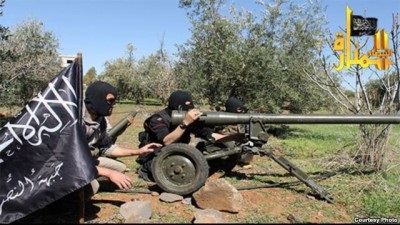The Turkish regime’s non commitment to the Sochi Agreement on Idleb encouraged the terrorist organizations to continue targeting civilians in Aleppo, Hama and Lattakia. The non- commitment of the Turkish regime in implementing Astana understandings regarding de-escalation zone in Idleb also enabled the terrorist organizations to target Aleppo city with shells containing chemical substances more than once in an indication that there is a decision to escalate terrorism by those who support the terrorist organizations positioned in Idleb, especially Jabhat al-Nusra and Daesh (ISIS) and their affiliated groups.
The Turkish regime is the first suspect in the facilitation, procession and use of chemical weapons by terrorists in Idleb against the civilians in Aleppo, which constitutes a grave escalation that contradicts Sochi Agreement.
The Turkish troops, which have entered illegitimately the Syrian territories in north-west Syria, are changing the features of the areas they are spread in through attempts to give the Turkish identity to areas they are occupying where they have changed the name of a Syrian town called “Qastal Mikdad” to Saljouq Aubasi, in addition to imposing the Turkish currency (Lira) instead of the Syrian pound as well as raising the Turkish flag over these areas and changing schools’ curriculum.
There is evidence that terrorists are preparing for staging a new chemical attack in Syria from Idleb. Chief spokesman for the Russian Ministry of Defense Major General Igor Konashenkov said in a recent press statement that the intelligence of the Russian forces in Syria monitored in the demilitarized zone in Idleb evidence indicating that the terrorists will repeat a chemical attack from Idleb. He clarified that the intelligence also spotted the sites for the launchers from which the terrorists fired shells laden with chemical substances against civilians in Aleppo.
The terrorist organizations are encouraged to conduct more chemical attacks because of the absence of the International will to put an end to terrorist groups operating in Syria and the politicizing of the OPCW and deviating its real objectives. Due to the insistence of the US and some Western states to include controversial and politically-motivated issues in it, the Fourth Review Conference of the Organization for the Prohibition of Chemical Weapons (OPCW) failed to adopt a closing document.
The Fourth Special Session of the Conference of the States Parties to Review the Operation of the Chemical Weapons (Fourth Review Conference) was held at the Hague on November 21-30.
This conference, which is held every five years, was an opportunity for bridging division among member states which is caused by politicization and double standards practiced by the West, particularly regarding the use of chemical weapons by terrorists in Syria, like what happened on November 24 in Aleppo.
Syria took part in negotiations regarding the closing document and stressed the importance of constructive dialogue, unifying positions, and enforcing the treaty in a balanced and unbiased manner.
It is regrettable that Western states led by the US insist on using the OPCW to serve political goals against states including Syria. Such behavior is worrying and could undermine the future of the organization. The failure of the conference to reach consensus on the closing document is an example of the politicization of the OPCW and using it to achieve sinister objectives.
K.Q.

